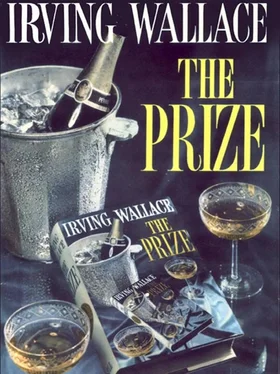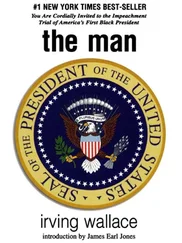He stared absently out of the car’s window, as the old narrow streets of the Left Bank blurred past, and he wondered what would finally happen to them. It was impossible to imagine a life without her, yet it was equally impossible to imagine divorcing Denise after twelve years. Yet, he asked himself, why not? Denise and he were childless, so that would pose no problem. There was adequate money since the discovery, so that was no problem, either. Denise was self-sufficient, too much so, he often thought. She had the capability to survive and adjust. She was not dangerously female -which he interpreted to mean that she was not an emotional hysteric, a leaner, an obsessive neurotic.
Still, why was he so fearful that she might learn of his affair? He examined the question. Was it that he was too sensitive to hurt an old companion? Or-was it because she was more than mere companion and wife? Was it because she was a partner in his work, and thus essential to him? Could Beaumont have been Beaumont without Fletcher? Or Gilbert have been Gilbert without Sullivan? Or Chang survived without Eng? Perhaps, in a dozen years, they had become the Siamese Twins, and to cut one off might mean death to both.
Possibly, divorce was wrong. Why not continue the status quo? Possibly, like Victor Hugo, he could spend his lifetime exactly like this, with a wife in one place and a Juliette Drouet somewhere else. How many years had Hugo openly managed his double life? Claude calculated: Hugo, at thirty-one, had met Juliette in 1833 when she was twenty-seven (Gisèle’s very age!), and kept her for mistress all the rest of her life, which was long, for she did not die until 1883. He had kept his mistress for fifty years, and when she had died, he had remarked, ‘The dead are not absent, but invisible’. But was Gisèle a Juliette Drouet? And was Denise a Madame Adèle Hugo? Or would it finally have to be a divorce, a scandal? Did the Curies ever think of divorce? Questions, questions. The devil with them. There was tonight, and Gisèle beside him, and tonight was all and the only reality. He focused his attention through the taxi window. They had turned into the rue du Bac…
The moment they were inside Gisèle’s living-room, Claude took her in his arms, holding her close and kissing her neck, and ear, and hair, and forehead, and lips. Shivering, feeling his imperative desire and her own, she pushed him off and, without a word, hurried into the bedroom.
Claude secured the door, then moved to the cognac decanter on the marble top of the aged wooden commode. He poured a drink, held the glass between his fingers, rolling it gently, warming the amber fluid with his warm palm. Leisurely, then, he sipped the cognac. Doing so, he surveyed the room. It possessed an air of casual elegance. Gisèle’s good taste was evident in the antique sycamore writing table inlaid with porcelain plaques, in the Louis XV period lamp bases and ashtrays found in the Flea Market, in the matted illuminated manuscript pages framed on the walls.
He could not help but contrast the charm of this with his own tasteless living-room, large, indefinite, disorderly, velvet sofas and chairs clashing with the wallpaper in imitation of the Directoire design, which Denise had furnished. In all fairness, Denise had possessed no more time than he had to devote to furnishings. Like him, she was a full-time scientist. Yet her poor taste extended to the matter of dress. He considered Gisèle’s flawless suits and dresses, and could only remember Denise wearing a spotty linen chemist’s smock, or at her best, ordinary blouses and loose skirts and flatheeled shoes that were usually scuffed. Thinking of his wife’s attire, he was reminded of Jonathan Swift’s description of the woman who wore her clothes as if they had been thrown on her with a pitchfork.
The cognac inspired him to further comparison, odious as this was, and he judged his two women, mistress and wife, side by side in nudity. He tried to be fair. Technically, divested of all clothing, Gisèle was less than perfection. When she was unclad, her lines were too spare, bony, almost skeletal. It was the body required of all mannequins who earned 20,000 francs a week, he knew, for its dimensions were made to display the drape of garments. In full attire, Gisèle was incomparable; in nudity, there was something missing. What made up for her physical deficiencies when disrobed was Gisèle’s impatient fever for love, and this Claude understood and appreciated. By comparison, Denise was shorter, fuller, rounder. Her shortcomings were her hair, shingled in a masculine bob, a nose too pugged, hips too wide, thighs too thick. In full dress, she was not soignée , and bulged and protruded too much to possess the mannequin chic. Stark naked, she was twice as attractive. And in all fairness, and this Claude admitted to himself even now, there was the advantage of her bosom. Denise had enormous pear-shaped breasts, and to this day, in her forty-second year, they hardly sagged at all. Still, he told himself, he had to admit a preference for Gisèle’s flatter breasts, as well as her flat hips and buttocks. They were unpretentious, but more inciting, because Gisèle was more inciting.
Was it caddish to project the comparison into bed? He sipped the cognac. It was wrong, but his mind unreeled the pictures. Sleeping with Denise, so fleshy, so tired, so inert, was like crawling into the womb. It was safe, easy, secure, never unexpected. It was nicely pleasurable. But Gisèle, taut, vibrating, aggressive, her magnificent flesh a wild and memorable offering, was-he considered a conservative description befitting a scientist-surfeiting? No. Enthralling? No. Captivating, yes, more, much more-captivating, satiating, and an indescribable ecstasy.
The memory of what would soon be repeated now aroused him. He finished his cognac, then quickly undressed, laying out suit and shorts on a chair, and stuffing his socks into his shoes on the floor. Naked, he went to the cupboard, found the maroon silk robe Gisèle had recently bought him, and pulled it on, loosely knotting the belt.
As he entered the bedroom, and halted beside the coiffeuse , she had just emerged from the bathroom. She was turning down the lights, all but the dim lamp behind the telephone on her bed-stand. As she moved, he could see the smooth outlines of her straight hips and thighs through the sheer mauve peignoir. When she turned to him, and saw his face, she smiled and straightened deliberately, her nipples revealed through the transparent chiffon.
She sat on the bed, kicked off her mules, and fell back on the pillows, her arms outstretched towards him. ‘What are you waiting for, chéri ?’
He went to the bed, and lowered himself beside her, and as always, could hear his heart, as she also heard it.
She reached across and pulled the cord of his robe. ‘Darling,’ she whispered, ‘my own-’ And then, ‘ Viens vite -’
Immediately, he slipped out of the robe and pressed against her. Eyes closed, sighing audibly, she parted her peignoir, and showed him herself. He placed his cheek against her breast, and she kissed his hair, and pulled him into her, and thus, in the familiar all-new way, they were joined.
From the bed-stand, the telephone shrilly jangled.
They froze in their embrace, as stiff, immobile, marble as satyr and nymph on a Pompeiian wall fresco.
They listened. The telephone rang a second time, louder, and a third time, a thunderclap.
‘Let it ring,’ he whispered.
‘No,’ she said suddenly, ‘it might be Monsieur Favre-’
She fumbled for the receiver, found it on the fourth ring, and brought it to her flushed face.
‘Hello-’
‘Mademoiselle Jordan?’ It was a woman’s voice. ‘This is Madame Marceau. Let me speak to my husband.’
Читать дальше












